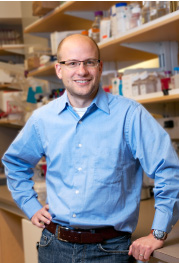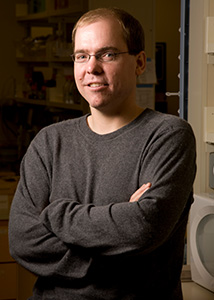 Genomics-based research projects that is led or co-led by members of the Faculty of Medicine garnered $101 million from the federal government — about 40 per cent of the total national investment.
Genomics-based research projects that is led or co-led by members of the Faculty of Medicine garnered $101 million from the federal government — about 40 per cent of the total national investment.
The projects chosen through Genome Canada’s Large-Scale Applied Research Program and its Genomics Technology Platforms aim to enable earlier and more precise diagnoses, provide better guidance for treatment, and make the health care system more effective.
The Faculty of Medicine has a leading role in eight of the 15 projects in the Large-Scale Applied Research Program, and two of the 10 Genomics Technology Platforms.
“What’s exciting about these genomics and precision health projects is how clinically-oriented they are,” said Marc LePage, President and Chief Executive Officer of Genome Canada. “Most are led by clinical scientists who deal with patients on a day-to-day basis and are well-positioned to apply the research to health care settings. Further, they are not just about developing new therapies to treat diseases, but about early diagnosis and intervention to better curb or manage diseases at their onset.”
The Faculty of Medicine projects receiving funding:
Silent Genomes
Goal: To address the lack of background genetic variation data for Indigenous populations in Canada.
Amount: $10.4 million
Leaders: Professor Laura Arbour and Professor and Associate Dean Wyeth Wasserman in the Department of Medical Genetics, and Associate Professor Nadine Caron in the Department of Surgery.
The dearth of background genetic data about Indigenous populations hinders precise genetic diagnosis. This project will develop a library of Indigenous genetic variation from a diverse group of First Nations in Canada, establish processes for Indigenous governance of biological samples and genome data, and create policy guidelines and best practice models.
Preventing adverse drug reactions
Goal: To discover biomarkers that will reveal genetic susceptibility to adverse drug reactions (ADRs) and to develop tools to educate and inform physicians and patients, beginning with five of the most severe ADRs in childhood cancer.
Amount: $9.9 million
Leaders: Professor Bruce Carleton in the Department of Pediatrics and Colin Ross in the Faculty of Pharmaceutical Science.
The team will analyze more than 6,125 DNA samples, corresponding medication use and ADR outcome data. They also will develop a comprehensive database linking clinical and genetic data as an accessible resource for researchers throughout the world. With the data they generate, they will provide testing at 10 Canadian pediatric cancer centres while studying barriers and facilitators to the uptake of ADR screening in the health-care system and the economic implications of introducing such testing into clinical practice. The team also will develop peer-reviewed clinical practice guidelines.
Deciphering relapsed lymphoid cancers
Goal: To better understand and exploit the genetic profile of relapsed lymphoid cancers.
Amount: $11.9 million
Leaders: Associate Professor Christian Steidl in the Department of Pathology and Laboratory Medicine, Professor and Department Head Marco Marra in the Department of Medical Genetics, and Assistant Professor David Scott in the Division of Medical Oncology
Relapsed lymphoid cancers differ considerably from their initial version, and there are no clinical tests to provide information on the prognosis and likely treatment outcomes, or to provide guidance to physicians and patients on the use of alternative therapies, such as small molecule drugs or immunotherapy. The team seeks to address that vacuum by sequencing relapsed tumours to identify novel biomarkers. They also will conduct economic analyses to better understand the cost-effectiveness and health-system impact of genomics-informed management of relapsed disease, and develop an e-health application to assist patients with shared decision-making.
Reducing kidney transplant rejection
Goal: To use genomic technologies to reduce the risk of antibody-mediated rejection (AMR) of transplanted kidneys.
Amount: $9.7 million
Leaders: Professor Paul Keown in the Division of Nephrology, Professor Stirling Bryan in the School of Population and Public Health, and collaborators at McGill University and the University of Alberta.
The project will seek to reduce AMR by 50 per cent by better matching of patients and donors, monitoring the immune response after transplantation to better predict AMR, and using personalized drug treatments to prevent rejection while avoiding infection or cancer. The team also will engage patients, providers and health care payers to study the legal, ethical, societal and economic considerations of introducing these strategies into clinical practice. Besides improved survival and quality of life, reduced caregiver burden and lower personal health costs, the project aims to minimize demand on the health care system by reducing the frequency of dialysis and re-transplantation, and by streamlining the management of chronic kidney failure. More information here.
Predicting childhood asthma
Goal: To develop a process for predicting asthma onset in children.
Amount: $9.1 million
Leaders: Professor Stuart Turvey in the Department of Pediatrics, Professor Michael Kobor in the Department of Medical Genetics, and Professor Brett Finlay in the Department of Biochemistry and Molecular Biology.
Babies who go on to develop asthma tend to be missing key microbes in their intestines (the microbiome) in the first few months of life. Genomically analyzing infants’ stools will identify whether a child is missing those microbes, enabling early diagnosis and prevention, which reduces the personal and economic toll of asthma. The research also will guide the ethical development of ways to replace these microbes, so as to prevent asthma from developing at all.
Improving access to genetic counselling
Goal: To determine the most efficient socio-economic, clinical, legal and economic methods of providing genetic counselling once genome-wide sequencing (GWS) becomes more widely available.
Amount: $4.2 million
Leaders: Associate Professor Jehannine Austin in the Department of Psychiatry, Clinical Associate Professor Alison Elliott in the Department of Medical Genetics, Larry Lynd in the Faculty of Pharmaceutical Sciences and a collaborator at McGill University.
GWS can be problematic, by revealing disorders or disease risk factors unrelated to the original reason for testing, or by generating complex findings that are difficult for non-expert health providers to interpret. Genetic counselors help patients and families make informed decisions about genetic testing and its results. The project will create an understanding of current and future needs for genetic counselling, develop best practices for the delivery of genetic counselling, improve access to the counselling (particularly for underserved patient populations) and develop a framework for the legal recognition of genetic counselors. The result will be increased access, patient satisfaction and cost-efficiency while providing genetic counselling to all Canadians who need it.
Diagnosing rare diseases
Goal: To identify the genetic cause of unsolved rare diseases and make genomic sequencing available to Canadians for rare disease diagnosis, thereby ending or even preventing years of testing and visits to multiple specialists.
Amount: $12.9 million
Leaders: A team that includes Affiliate Associate Professor Clara van Karnebeek in the Department of Pediatrics.
The group will work with provincial ministries of health, beginning with Alberta and Ontario, to determine how best to include genomic sequencing as a clinical test to diagnose rare diseases. In doing so, the project will more than double our ability to diagnose unsolved rare disease, while building the infrastructure and tools needed to improve rare disease diagnosis worldwide.
Screening for prenatal abnormalities using maternal blood
Goal: To make non-invasive prenatal screening (NIPS) the entry-level test for Down syndrome
Amount: $12.2 million
Leaders: Professor Sylvie Langlois in the Department of Medical Genetics and a collaborator at Universite Laval
The discovery that fetal DNA is present in the mother’s blood during pregnancy has led to the development of NIPS, a genomics-based maternal blood test that is a reliable way of testing for Down syndrome. Partly due to its cost, NIPS is used only after a mother has tested positive on less accurate, less expensive tests; if NIPS confirms those findings, the mother typically undergoes amniocentesis. Making NIPS the entry-level test could benefit women by detecting an affected pregnancy earlier and more accurately. The project aims to provide high-quality evidence to support the use of NIPS instead of traditional screening tests. It also will study the cost-effectiveness of expanding screening to other conditions and the ethical, social and legal implications, provide strategies to promote shared decision-making between couples and health-care professionals, and develop NIPS technology to reduce its costs by 50 per cent and expand its ability to detect other anomalies.
Genomics Technology Platform of Genome Sciences Centre
Goal: To expand personnel and services
Amount: $9.6 million
Leaders: Professor and Department Head Marco Marra and Professor Steven Jones in the Department of Medical Genetics, with Corey Nislow in the Faculty of Pharmaceutical Sciences and Martin Hirst in the Faculty of Science.
The centre has provided reference genomes for bovine, spruce, poplar, Atlantic salmon and Chardonnay grape; human reference epigenomes; and human, mouse and zebrafish cDNA reference transcriptomes. Its whole-genome analysis is being used to inform personalized treatment planning for cancer patients. The expansion includes new technology development, new assessment and data processing, and new bioinformatics analysis. It will also develop a bioinformatics virtual machine to provide researchers with the computational tools they need to interact with, visualize and analyze data.
The Pan-Canadian Proteomics Centre
Goal: Expansion into a truly pan-Canadian enterprise
Amount: $11.1 million
Leaders: Professor and Interim Department Head Leonard Foster in the Department of Biochemistry and Molecular Biology, with Christoph Borchers of the University of Victoria
The centre will establish new nodes at BC Cancer and at the Toronto’s Hospital for Sick Children, as well as a new site for clinical proteomics at Montreal’s Jewish General Hospital. This new Pan-Canadian Proteomics Centre will broaden in-house technological expertise, increase the range of technologies offered, increase capacity for core service provision and build a vital network of key collaborators. It will have a greater emphasis on translation of technologies into real-world applications and tighten linkages to clinical facilities.




